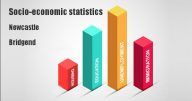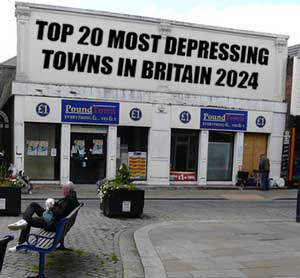We have collated a series of socio-economic statistics for Newcastle in Bridgend from UK government sources such as the 2021 Census and the Index of Multiple Deprivation. They should give you a broad snapshot of the area and the surrounding locations. Are the residents of Newcastle older than the national average or younger? What is the population of Newcastle and Bridgend? Is Newcastle an unemployment hotspot? This page should provide you with the answers.
How many residents own or rent their home in Newcastle and
We have taken the raw data from the 2021 census and calculated what proportion of people in Newcastle either own or rent their home. All percentages have been rounded to two decimal places. 0 of residents own their home either outright or mortgaged. 0 of Newcastle residents rent their home either privately or through a social landlord.
| Area |
Owned |
Rented |
|
0% |
0% |
|
0% |
0% |
|
0% |
0% |
|
0% |
0% |
Newcastle has a higher level of home ownership than than the national average.
Newcastle compared to other wards in
Newcastle is ranked out of 0 wards in for the percentage of home owners.
Newcastle Health Statistics
| Area |
VG |
G |
F |
B |
VB |
|
0% |
0% |
0% |
0% |
0% |
|
0% |
0% |
0% |
0% |
0% |
|
0% |
0% |
0% |
0% |
0% |
|
0% |
0% |
0% |
0% |
0% |
VG = Very Good, G = Good, F = Fair, B = Bad & VB = Very Bad
Newcastle Education Statistics
We have taken the raw data from the 2021 census to found of the level of education Newcastle residents have in terms of formal qualifications as a percentage. The UK government breaks qualifications down into 7 levels. A detailed explanation of these levels can be found here. However, the Census groups these into just 4 \'levels\'. Here are some examples of the qualifications each census level represents when not stated;
- Level 1 - GCSE grades D, E, F, or G & below
- Level 2 - GCSE A*, A, B, C or O Level grades A, B or C
- Level 3 - A or AS qualification at any grade
- Level 4 - HNC, Bachelors Degree, Masters Degree or Phd
In this first table we have compared Newcastle to the national average for .
| Level |
|
|
| No Qualifications |
0% |
0% |
| Level 1 |
0% |
0% |
| Level 2 |
0% |
0% |
| Apprenticeship |
0% |
0% |
| Level 3 |
0% |
0% |
| Level 4 |
0% |
0% |
Newcastle & Immigration Statistics
We have analysed the Census 2021 raw data on country of birth and compiled immigration statistics as percentages of the population. All percentages have been rounded to two decimal places. Below are the figures for Newcastle in the local area district.
| Area |
Born in UK |
Born outside UK |
|
0% |
0% |
|
0% |
0% |
|
0% |
0% |
|
0% |
0% |
Newcastle compared to other wards in
| # |
Ward |
Born in UK |
Born outside UK |
';
Newcastle is ranked out of 0 wards in for the number of residents born outside of the UK.
Newcastle Age Distribution Statistics
We have taken the raw data from the 2021 Census and the calculated the proportion of age groups in .
| Age Band |
Proportion |
| 4 & under |
 |
| 5 - 9 years |
 |
| 10 - 15 years |
 |
| 16 - 19 years |
 |
| 20 - 24 years |
 |
| 25 - 34 years |
 |
| 35 - 49 years |
 |
| 50 - 64 years |
 |
| 65 - 74 years |
 |
| 75 - 84 years |
 |
| 85 years & over |
 |
What are the occupations of the residents of Newcastle?
The largest employment sector in Newcastle is Managers, Directors & Senior Officials. The smallest employment sector is Elementary Occupations.
| Sector |
Proportion |
| Managers, Directors & Senior Officials |
% |
| Professional Occupations |
% |
| Associate Professional & Technical |
% |
| Administrative & Secretarial |
% |
| Skilled Trades |
% |
| Caring, leisure & Other Services |
% |
| Process Plant & Machine Operatives |
% |
| Elementary Occupations |
% |
Newcastle Unemployment Statistics
Since the introduction of Universal Credit, The Department for Work & Pensions have not issued any statistics (in our view) that can be used to ascertain the levels of unemployment or under employment in the UK, just meaningless geographic counts. However, the Office of National Statistics does publish claimant counts of people receiving out of work benefits, be that legacy Jobseeker’s Allowance or Universal Credit as a proportion of people over 16. These figures are usually updated once a month and are for Local Authority Districts and Unitary Authority Districts. So below are the figures of .
| Area |
Unemployed |
Yearly Change |
|
% |
% |
|
% |
% |
|
% |
% |
| UK |
3.7% |
-0.3% |
The 2021 census had data on people who were economically active (seeking work) yet unemployed on Census day (Sunday March 21st 2021). These statitics do cover Newcastle on a ward level. However, it has to be noted that the Census day was during the height of the Covid19 pandemic and therefore are not reflective of normal levels of unemployment. For example, between March 2020 and June 2020 people claiming Universal Credit doubled in most areas of the United Kingdom and then steadily declined up to the day of the Census and beyond. This data also contains the proportion of people in part-time work (working between 1-35 hours per week), which maybe an indicator of under employment in Newcastle.
| Economic Status |
Proportion |
| In Employment |
0% |
| In Part-Time Work |
0% |
| Unemployed |
0% |
100% of the people in work, are in full-time employment in Newcastle
What is the population of Newcastle and Bridgend?
The table below contains the populations figures for each ward in Bridgend including Newcastle. These population ONS figures are estimated are dated Mid 2020.
| Ward |
Population |
| Aberkenfig |
2560 |
| Bettws |
2280 |
| Blackmill |
2512 |
| Blaengarw |
1758 |
| Brackla |
12219 |
| Bryncethin |
1634 |
| Bryncoch |
2726 |
| Bryntirion, Laleston and Merthyr Mawr |
9333 |
| Caerau |
7017 |
| Cefn Cribwr |
1555 |
| Cefn Glas |
1639 |
| Coity |
5293 |
| Cornelly |
7605 |
| Coychurch Lower |
1398 |
| Felindre |
2851 |
| Hendre |
4250 |
| Litchard |
2419 |
| Llangeinor |
1273 |
| Llangewydd and Brynhyfryd |
2601 |
| Llangynwyd |
3066 |
| Maesteg East |
4787 |
| Maesteg West |
5730 |
| Morfa |
4709 |
| Nant-y-moel |
2421 |
| Newcastle |
5577 |
| Newton |
3725 |
| Nottage |
3225 |
| Ogmore Vale |
3197 |
| Oldcastle |
5245 |
| Pen-y-fai |
2442 |
| Pendre |
1791 |
| Penprysg |
3207 |
| Pontycymmer |
2401 |
| Porthcawl East Central |
3425 |
| Porthcawl West Central |
3563 |
| Pyle |
7712 |
| Rest Bay |
2200 |
| Sarn |
2446 |
| Ynysawdre |
3747 |
| Bridgend Total |
147539 |
Last updated: 20/02/2024, Additional Sources: Office for National Statistics & Department for Work & Pensions.
How grim is your Postcode?













